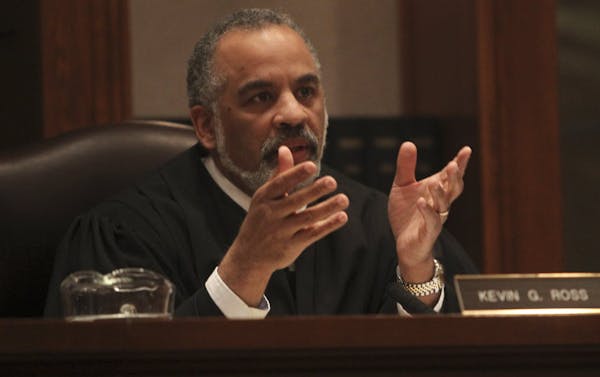The Minnesota Court of Appeals upheld Amy Senser's felony criminal vehicular homicide convictions Monday, ruling the evidence was clear that she knew she struck a car or a person when she left the scene of a fatal accident nearly two years ago.
The court acknowledged the trial court judge's missteps in the case but said they were not enough to have affected the outcome of the jury's decision.
In the unanimous decision, a three-judge panel said overwhelming circumstantial evidence supports a Hennepin County jury's guilty verdicts against the wife of former Minnesota Vikings player Joe Senser. The panel also determined that the events following the deadly hit-and-run crash show Senser was aware she hit more than a traffic barrel when she struck and killed Anousone Phanthavong, 38, on a darkened Minneapolis freeway ramp before driving away.
"In sum, considering the circumstances proved … we conclude that only one reasonable conclusion can be drawn: Senser knew she hit either a person or a vehicle on the Riverside ramp that night," Judge Margaret Chutich wrote. "No other rational inference is possible."
The ruling could be the final bid for early freedom by Senser, 46, who is nearly a year into a 41-month prison sentence at the women's correctional facility in Shakopee. She was convicted in May 2012 for striking Phanthavong as he was putting gas in his car on the Riverside Avenue exit ramp of Interstate 94 in Minneapolis.
Senser's attorney, Eric Nelson, has not yet indicated whether he would ask the Minnesota Supreme Court to hear the case. He said early Monday that he would release a statement, but later rescinded. Joe Senser could not be reached for comment. In an interview with KARE 11 News, Senser said he wasn't surprised by the ruling, and said his family still felt remorse.
"Anousone was a really good guy and he was loved by a lot of people," he told the station in an exclusive interview.
High court hurdles
Unlike the Court of Appeals, the Supreme Court can decide whether it will hear arguments on a case.
The Appeals Court opinion in Senser's case was unpublished, meaning it doesn't create new law or address novel issues, creating another hurdle for Senser's defense to bring her appeal before the state's high court.
Senser's lawyer has 30 days to petition the Supreme Court to hear the case, while the Hennepin County attorney's office has 20 days to respond to the petition. The court has no deadline on when it decides whether to hear the appeal.
Should the Supreme Court say yes, Senser, who is scheduled for supervised release in October 2014, could be out of prison by the time a decision is rendered. However, the appellate process is likely over, said Scott Swanson, director of academic achievement at the University of St. Thomas School of Law.
"Somebody took a lot of care to write this opinion, and it's lengthy, but it doesn't create new law — it applies to standard law," he said. "That kind of spells doom for an appeal."
The 32-page opinion came nearly two months after Nelson argued for Senser's freedom before the Appeals Court. Nelson claimed the evidence didn't support the verdicts, and that Senser was denied a fair trial in part because of multiple rulings by District Judge Daniel Mabley.
Mistakes deemed not crucial
The court agreed with Nelson that Mabley abused his discretion on two instances — once by allowing hearsay testimony by a State Patrol investigator, and another by failing to immediately disclose a jury's post-verdict note that said "We believe [Senser] believed she hit a car or vehicle and not a person." Senser never struck Phanthavong's car.
However, the Appeals Court said neither ruling influenced the jury's verdicts.
The hearsay testimony from Sgt. Daniel Beasley involved transcript of his interview with Dr. Marvin Sponaugle, who said Joe Senser told him the morning after the accident that the Sensers saw blood on the sport-utility vehicle she was driving that night.
The Appeals Court ruled the statement should not have been admitted at trial.
However, Sponaugle's statement, which was a single page of 1,200 pages of trial testimony, was harmless to Senser, the court reasoned.
Secondly, although Mabley should have immediately disclosed the jury's note to the defense and prosecution in open court, it did not affect the jury's verdicts.
Nelson argued that the note exposed a flaw in jury instructions, in which they were told to decide whether she knew she caused injury, death "or damage to another vehicle."
A duty to stop
It didn't matter, the Appeals Court ruled, because under the law Senser still had a duty to stop, regardless of what the members of the jury believed.
"Some members of the jury could have concluded that Senser saw [Phanthavong's] car in her rearview mirror after the collision and concluded that she struck the car, while others could have thought that she knew she hit [Phanthavong] himself," Chutich wrote. "The jury was not required to agree on whether Senser knew she hit a person or a vehicle, because hitting either would have imposed a duty upon her to stop."
Joe Daly, professor emeritus at Hamline University School of Law, agrees that the Minnesota Supreme Court is unlikely to hear Senser's case, but believes it should.
He said some questions, including the jury note and instructions, did not appear to be fully answered in the Appeals Court opinion.
"It's kind of sad, because this case, to me, raised a lot of interesting questions," he said. "If the jury didn't believe that she hit a person, then how could she be convicted of a crime that she knew she hit a person?"
Abby Simons • 612-673-4921

Lacrosse 2024: Boys or girls, discussion begins in the same place

Will 'shotgun only' zone for deer in southern Minnesota be abolished?
One killed in head-on crash in Coon Rapids

Edina could see first zoning update in 50 years

